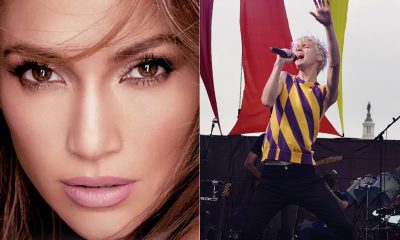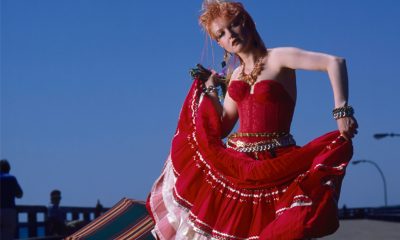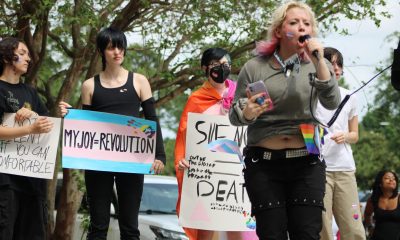a&e features
Former Scissors Sisters frontman Jake Shears on his book, tour, album and gay life in the Big Easy
Glam gender-bender plays two nights at the El Rey Theatre this weekend
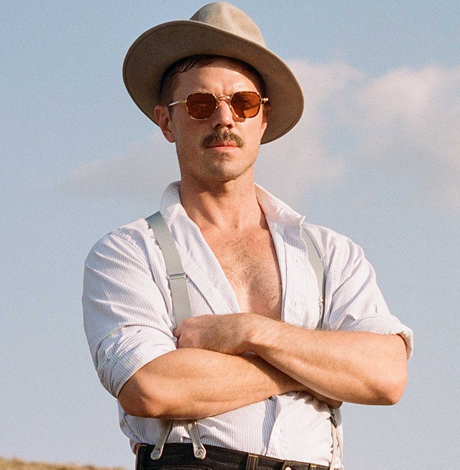
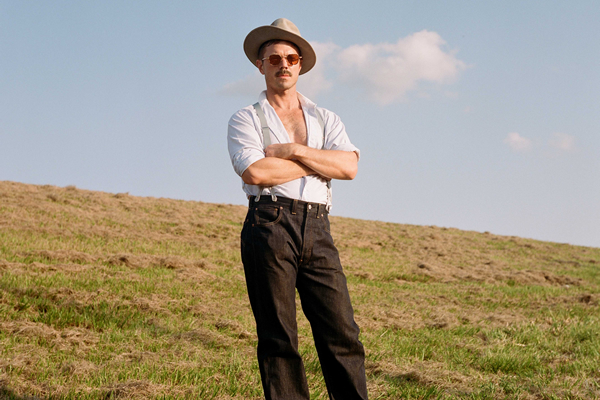
Jake Shears says it took time to find his creative footing after the Scissor Sisters parted ways six years ago. (Photo by Greg Gorman)
Jake Shears needed some time to find his footing.
“After more than a decade as one of pop music’s most cocksure and buoyant frontmen,” his press bio says, “Shears suddenly found himself alone and adrift a few years ago, nursing a broken heart and staring down an uncertain future.”
Since the early 2000s, Shears had anchored Scissor Sisters, the glam-pop band known for hits like “Filthy/Gorgeous,” “I Don’t Feel Like Dancin,’” “Fire with Fire” and “Let’s Have a Kiki.” They went on indefinite hiatus after the 2012 album “Magic Hour” but it took some time for Shears, who found himself single in 2015 after the demise of a decade-plus relationship, to figure out what was next.
After relocating to New Orleans in search of inspiration, he’s come roaring back in 2018 with a January stint as Charlie in “Kinky Boots” on Broadway, the February release of his memoir “Boys Keep Swinging” and his eponymous debut solo album, which came out last month to solid reviews. He wraps his solo tour with two shows at The El Rey Theatre this weekend.
He spoke to the Blade by phone in early September (just prior to turning 40 in October) from his apartment in New Orleans. His comments have been slightly edited for length.
LOS ANGELES BLADE: Was it hard adjusting to the humidity?
JAKE SHEARS: No, I love it. I’m heading to London tonight and I’m just thinking like, “Oh God, I can’t just walk outside in a tank top and gym shorts 24 hours a day there.” I love it down here so much. It’s a pretty good life.
BLADE: So you live in New Orleans pretty much all the time now when you’re not touring?
SHEARS: Yeah, I’m walking into my apartment right now. I split my time. I end up all over the place but it’s where I am for long stretches of the year. … I spend about a third of the year here.
BLADE: Do you get recognized much there when you’re just out doing your normal routine?
SHEARS: Well it’s like a small town here so you kind of get to know everybody anyway and then on weekends, like Decadence was last weekend and there were lots of gays in town so yeah. But other than that, not really. It’s just a really small town here so everybody already kind of knows one another.
BLADE: What’s gay life like in the South? Just with friends, dating, sex — all that.
SHEARS: Well down here you don’t necessarily want to date other locals. … If you do sleep with somebody down here, you’re gonna see them for the rest of your life so you have to really think about whether you want that or not. But it’s just a funny little thing. It’s a sexy place to be. There’s always a huge influx of tourists so there’s always fresh faces and not only that, it’s people who are happy to be here and it’s a good vibe overall. It’s a very romantic city. You don’t have to wear a lot of clothes. It kind of fosters romance and flirtiness.
BLADE: You said in another interview you went there seeking inspiration. How long were you there before that really hit and the songwriting started?
SHEARS: About a week, maybe two weeks. It was pretty early on. I think it was more about the decisions I’d made in my life. I was making some big decisions just for myself that I needed to make. I really needed to change my life and once I made the decision to do that, moving to New Orleans was kind of symbolic and was part of that. And, you know, when that happens, when I’m happy and on the right path, I start writing songs. It didn’t take very long.
BLADE: I read that you recorded the album in live takes straight through and said that was nerve wracking. Now that it’s all done, was it worth it?
SHEARS: Oh my God, yeah. I couldn’t be happier with this thing. It’s been a big project and it’s nerve wracking in a way because just over the whole thing, I put a lot on the line. I hope I get to make a record like this again someday — just making a record exactly the way I want to. As far as the cost/benefit analysis, it cost me a lot. Just financially and time wise and all that stuff, but the benefit on the other side is that I’ve made something I’m just incredibly happy with and proud of.
BLADE: Was it hard to keep it fresh doing take after take in the studio?
SHEARS: No, no, no, no. When you’re recording like that, everybody was so rehearsed. It was really exciting. It never got boring, that’s for sure.
BLADE: When you were writing and/or recording “Creep City,” did you have a hunch it would be the first single or did that come later?
SHEARS: You know, it was really a toss up. I don’t think there was a really obvious first single on this record. I think it could have been a whole bunch of songs. I chose that song because I felt it was really good overall and I felt it really represented the whole album just sonically and I just felt like it was a great liftoff for the record. … I could also visualize a video for it. It’s one of my favorites on the record. It just sort of represented the whole thing in a way.
BLADE: Would you say this is your breakup album? That’s such a thing, were you conscious of wanting to avoid any cliches?
SHEARS: I don’t know if I can answer that. I don’t think it feels like a breakup album. I mean, this isn’t Beck’s “Sea Change.” It’s a pretty fun record. I don’t think it’s really about a breakup, I think it’s more about reassessing myself and sort of rediscovering who I am in this moment in time and I think it has less to do with a breakup necessarily, although that’s in there. Would you say that?
BLADE: Well, listening to it, I felt it was very bombastic and joyous so I was surprised when I read the lyrics and saw how dark some of it is.
SHEARS: Yeah, I love that and that’s one of my favorite things to do. I have like a real big dark streak in me and I love making happy, really fun music that has heavier themes to it. I just love that juxtaposition. That’s absolutely there, but it was really important to me to make, you know, a fun record with different colors to it. I love making my ballads too. That’s definitely part of what I do.
BLADE: Why did you feel now was the time for a memoir?
SHEARS: I wrote the book at the same time I was making the album and I thought it was really good as I was sort of reassessing where I am and who I am now, I had to go back and reassess where I’ve been and what I’ve done and I think they both kind of informed each other and it was sort of a good way to put certain things to bed in a way and make peace with certain things. It’s kind of a cliche to say it was good therapy but in a way it was good to reevaluate parts of my life while I was making this new thing and it was awesome to get to do both of them together.
BLADE: Would you like to do more Broadway or was “Kinky Boots” a one-off?
SHEARS: No, I do, I do. I love it so much. I mean, theater is a world I love being in. I love writing theater and making musicals. Now I love being in them. I definitely am going to continue. Now that’s part of my DNA and I absolutely would love to be in another show and I’m going to be writing more shows.
BLADE: How vocally taxing was it compared to your regular stuff?
SHEARS: I gotta say, it was really hard. Those Cyndi Lauper songs are no joke. They’re really tough and I worked and worked really hard at it. You know, your voice gets stronger and everything but doing eight shows a week like that, it’s also cumulatively exhausting and so by the end — I did about a hundred performances — I was really having to crank up the engine to get that final high note and the big punch at the end of the song. So it was super challenging, yeah.
BLADE: When you’ve been off the grid for awhile, do you have to get back in shape or do you always stay pretty trim?
SHEARS: Goodness (laughs). I’ve got my moments. I’m a Libra so I have a lot of balance in my life. I work really, really hard and I play really, really hard. I really try to keep a balanced existence. I’m constantly just trying to take care of myself in the midst of the chaos of what I do.
BLADE: But you never just put on 20 pounds when you’re off the road for a year or something like that?
SHEARS: Oh, I’ve had moments of not being as in shape as I wanna be but I’m doing the best to take care of myself when I’m eating well or whether that’s just getting enough sleep and not drinking too much. I just do my best to try to feel as good as I can because otherwise life just isn’t much fun.
BLADE: Where did that cool vintage car in the “Big Bushy Mustache” video come from?
SHEARS: It’s my neighbor’s, LeRoy. I’m looking out right now at his back yard. He’s in the video too. The videos you see from this album are basically community productions. I made those videos out of my pocket on a shoestring and everybody from the locations to the costumes — everything that you see, people pitched in, everybody got together and it was so much fun. It took over a hundred people to make those videos and that’s one of the things that really warms my heart. It was a whole bunch of people banding together. The “Creep City” video — that’s just a snapshot of the New Orleans community.
BLADE: Has it been hard sequencing in Scissor Sisters material with the new stuff on tour?
SHEARS: No. I’ve just done a bunch of shows in the U.K. and it’s a really good pace I’ve got with the Scissors stuff. I’ve chosen certain songs very strategically and it’s fun mixing them up. I went out of my way to make sure this new stuff is part of the same body of work. I wanted it to feel that way and I wanted to be able to present it all as my body of work. In the show, it definitely goes together.
BLADE: Are you touring with people who played on the album?
SHEARS: Oh yeah. Mr Hudson is on bass, Craig Pfunder is on guitar who does all the music director stuff, he plays guitar on my record. Mr Hudson, I wrote a bunch of songs with. Right now I’ve got Patrick Hallahan from My Morning Jacket on drums and I’ve got this amazing saxophonist, this awesome guy named Stephen J. Gladney on sax. So this is a pretty cracker jack band. It’s a great band.
BLADE: Was it an easier transition to the stage than usual since you recorded these songs live in the studio?
SHEARS: In a way because a lot of these songs were originally written with either guitar or piano. When you start small with a song then make it bigger, it just makes it easier. It was written in a very different way from the way I normally always wrote stuff. It’s been fun to play it from the top. It hasn’t been a huge challenge.
BLADE: I know it’s a much different style of music, but do you feel much kinship with Rufus Wainwright? For so many years, you two were about the gayest thing we had pretty much.
SHEARS: Oh my God, absolutely. I think you can hear, he’s a huge influence on my music and we’ve always been friends and I think he’s amazing, just a one-of-a-kind person. I think he’s brilliant and hilarious and I just love him a lot and I’m proud — if he’s my peer and part of my generation of music or if we’re viewed on any kind of level together, then I’m really proud of that.
BLADE: Lots of male pop singers today are doing the falsetto thing like you. Who has the best male falsetto voice?
SHEARS: You mean right now?
BLADE: Any era.
SHEARS: I would just have to say the Gibbs. You know, I was just listening to “Nights on Broadway” last week and it’s just so good. There are moments where they could do it perfect, then they could also do it ragged and imperfect as well and it just sounded so good. So I mean, I feel like they’re kind of the kings of that.
BLADE: Have you heard Troye Sivan’s new record?
SHEARS: Just the singles. I gotta sit down and listen to the whole thing. I’m really excited about it. What do you think?
BLADE: I like it. It’s so nice to see someone singing about gay life so unabashedly.
SHEARS: Seriously. I’m so happy about it. I love the singles and it seems like people are absolutely loving the album. I’m glad you reminded me of it. I’m gonna give the whole thing a listen today. But yeah, I want to see that really go through the roof. He deserves it and it’s just time. I just think we’ve waited long enough. It’s time for a big, queer just pop star and yeah, I just think it’s time so I’m very excited.
BLADE: Do you have any pet peeves about celebrity culture of the way it’s covered in media?
SHEARS: There’s nothing I hate more than a headline that says somebody is “clapping back” at so and so. Or so and so, “claps back.” Basically just news stories about people fighting on Twitter. That’s a pet peeve of mine. It’s just the snake eating itself.
BLADE: Why do you think the Scissors were bigger in the U.K. than the U.S.? Does the Hot 100 here just reflect more of the hetero, rednecky parts of the country?
SHEARS: Well I think it was just a narrative that took hold and I can pinpoint the top of that narrative. I talk about it in my book. We were over there working for like six months before we broke over there and at that time, album releases were staggered so we released in the U.K. in February and we didn’t come out in the U.S. until July so we broke in the U.K. in June. So when we put out our record, we were just getting started again and the New York Times wrote a little sidebar with the headline that said, “Scissor Sisters hot over there, cool over here” and I credit that one thing in the New York Times, that really snarky little piece to starting that narrative. I think that’s why I still get that question. I don’t think we entirely got a fighting chance over here but over the years, it kind of leveled out. By the time we put our our fourth record, we were at the Palladium two nights, we were at Terminal 5 two nights, so the whole thing leveled out. We had extraordinary success over there, the kind of success that barely anybody has anywhere, so I don’t necessarily — I just think it was an extraordinary moment and I’ve never ever felt we were less successful over here at all. … It doesn’t really bother me. But I think that’s the origins of it, this tale of the Scissor Sisters on both sides of the Atlantic.
BLADE: Did you ever think about doing a solo album when the Scissors were together or was there just not really time? It’s not unheard of.
SHEARS: It never really crossed my mind as something I realy wanted to do. I always thought a solo record would feel really sort of narcissistic. I never really thought of myself as a solo performer. I was always kind of shy about that. Even when I would do appearances without the band, I would always feel very much like, “Why am I here, I don’t really belong here.” I’ve always kind of had that self doubt thing when I was by myself. So no, I don’t really. But it’s been a little bit of a personal — I hate the word journey — but it’s been like a little bit of a road to get to the spot where I can, you know, feel like there’s a reason for me to be singing on my own.
BLADE: You’ve played a lot with genderfuck in photos and magazine shoots. Do you like to wear dresses or paint your nails in your regular life?
SHEARS: Oh, I love wearing big frilly dresses (laughs). Especially in New Orleans. Like for Decadence, I have a naughty nurse uniform. Everybody was in harnesses and I have my little candy striper outfit. So, I don’t know, it’s just that I have a good time wearing a dress sometimes. I don’t even really think about it. I’m just kind of drawn to what feels good.
BLADE: Do you think there will be deluxe reissues of the Scissor Sisters albums eventually? Are there many outtakes from those sessions? B-sides and alternate takes and stuff like that.
SHEARS: My dream for the 10th anniversary of “Night Work” is to do — there’s a whole album that’s attached to that that was scrapped. There’s this whole lost record to that that I would love to put out in 2020. I’m hoping Babydaddy and I can get together to do that. I would love for people to hear that stuff. Just great songs.
BLADE: This is all just sitting on a hard drive somewhere?
SHEARS: Yeah, yeah, yeah. Totally. And there’s a lot of it. There’s hundreds of songs.
BLADE: What was the longest or most arduous video shoot you ever did?
SHEARS: The “Comfortably Numb” video. It was two days in a big water tank in Devon, England and …. it was a very, very, very tough video to shoot. I got very sick afterwards.
BLADE: You’ve talked about enjoying the freedom the solo record has afforded you but it also seemed like you held an enormous amount of influence in Scissors. I know you dug in your heels about the controversial Mapplethorpe butt photo for “Night Work,” for example. So how strong was that itch really?
SHEARS: Well the thing about being a band is you just want everybody, yeah, you’ve got your vision and what not but also you want everybody to be happy and you want everybody to feel like they’re represented. I definitely had my own vision for the band that was implemented in many ways, but at the same time, the thing that’s nice about doing stuff by myself is that I don’t have to worry about making everybody happy. … All I have to worry about is making myself happy and that’s an amazing feeling creatively and it’s made me feel very liberated in a lot of ways.
BLADE: Are you seeing anybody now?
SHEARS: No, I’m not. I wish I could but I’m not physically in the same place enough now to really be able to spend enough time with anybody that it would really make sense. I don’t know if it’s gonna be possible for me for awhile because (of that) which is kind of a bummer. I’d love to be in a relationship. I’m definitely romantic and I get lonely and I would definitely love to have that connection with somebody. But it wouldn’t be fair to somebody else to not be around.
BLADE: Do you have a type?
SHEARS: I used to think I did but now I’m really only truly attracted to somebody when I spend a lot of time with someone and get to know them. Maybe it’s just a thing about getting older but it’s a lot more about personality to me now and I can get surprised by somebody. I’ll always realize that somebody can be right in front of you and you don’t even know it yet. So my thing is just about getting to know somebody and that’s what I’m into. It could be any kind of type, but it’s just more about who somebody is.
BLADE: Are you and your ex on speaking terms? Were you able to salvage any friendship out of that?
SHEARS: Oh yeah, absolutely. I love him very much and I’m proud of him and he’s an amazing person. He was actually just calling my phone a few minutes ago when we were talking. But yeah, absolutely. And we co-parent a little border terrier so we’re very much still connected.
BLADE: Were there any epiphanies about yourself that surprised you writing the book and album?
SHEARS: I think the main thing that I learned from all of it is I used to kind of think that there was always some kind of a deadline all the time and I think I just really learned, just as far as the work itself, I just want to make good stuff that I love and that’s totally satisfying to me. So whether it takes another five years for me to write another record now, I really don’t care just as long as it’s something that I love and that means something to me. That’s the most important thing about putting stuff out in the world. And by the way, that’s a lesson I keep learning over and over and over again since day one. It’s always something I keep realizing.
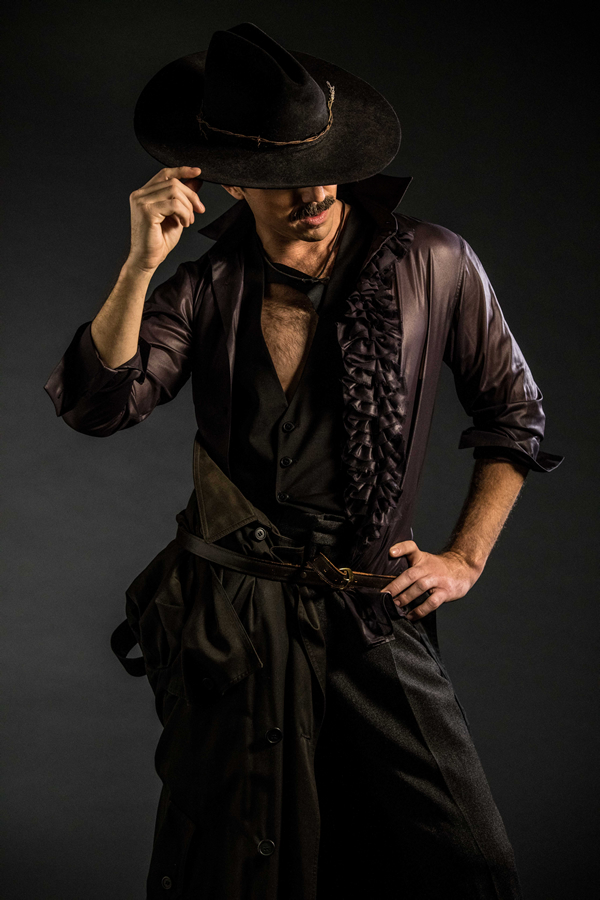
Jake Shears plays two nights at the El Rey Theatre this weekend. (Photo by Raphael Chatelain)
a&e features
35 years after ‘Truth or Dare,’ Slam is still dancing
Salim Gauwloos on Madonna, HIV, and why he almost didn’t audition for Blond Ambition Tour

Most gay men of a certain age remember “the kiss.”
It was the moment Madonna’s dancers Salim Gauwloos and Gabriel Trupin locked lips in the hit 1991 documentary film “Truth or Dare,” which is celebrating its 35th anniversary this spring.
The kiss was hot, but what made it groundbreaking is that it appeared in a mainstream Hollywood movie that screened in suburban multiplexes across the country. This wasn’t an obscure art house film. The movie, and tour on which it was based, received months of breathless media attention all over the world for bold expressions of female empowerment and queer visibility. Madonna was threatened with arrest in Toronto for simulating masturbation on stage and Pope John Paul II urged Catholics to boycott the show, triggering a media firestorm.
“Truth or Dare” was billed as a behind-the-scenes documentary of the tour, but it quickly became clear that the real star of the show wasn’t Madonna, but rather her colorful troupe of seven backup dancers, six of whom identified as gay: Kevin Stea, Carlton Wilborn, Luis Xtravaganza Camacho, Jose Gutierez Xtravaganza, Gauwloos, and Trupin; Oliver Crumes III identifies as straight.
We saw them party and march in the New York City Pride parade. They were unabashedly queer at a dangerous time — before protease inhibitors began to stem the AIDS plague and before most celebrities and politicians embraced the gay community in any real way. Being out in 1991 carried major risks to career and reputation.
Enter Gauwloos, one of those brave dancers who vogued his way into the hearts of countless gay men entranced by his handsome looks, his stage presence, and dance skills.
Gauwloos — known then and now as “Slam”— sat down with the Blade to talk Madonna, the lasting impact of “Truth or Dare,” the public disclosure of his HIV status, and plans for a new book on his life.
His story is fascinating — from growing up in Europe to dancing in New York to landing the gig of a lifetime with Madonna. He performed on that tour while secretly HIV positive and went without medical treatment for 10 years because he was living in the United States as an undocumented immigrant. Not even Madonna knew of his HIV status. Two other dancers on the tour were also HIV positive but no one talked about it. Ironically, Madonna was singing “Express Yourself” and advocating for condom use during her concerts yet backstage three of her dancers were secretly positive.
“A lot of people were dying so I wasn’t going to tell Madonna I had HIV,” said Slam, now 57. “And the others didn’t either. It wasn’t the moment to do it. She used to make speeches about Keith Haring and AIDS and I thought it’s going to be me next.”
Gabriel Trupin died of AIDS in 1995. Slam was diagnosed at age 18 in 1987, a frightening time when a positive test result often meant a death sentence. He booked the “Blond Ambition Tour” at age 21 after moving to New York. His friends encouraged him to audition but Slam resisted because he wasn’t a big Madonna fan.
“It was crazy, everyone wanted that job,” he said, “but I wanted to dance with Janet Jackson and Paula Abdul.” He listened to his friends and shortly after the audition, Slam received a call from Madonna herself inviting him to join the tour.
“We all wanted to be stars but not even Madonna knew how big that tour would become. The way it was choreographed and directed, the stars aligned. … It never looks dated even today.”

The world tour kicked off in Japan in April 1990 then moved to the United States and Europe, stirring controversy wherever it went. There was the iconic cone bra; the aforementioned simulated masturbation during “Like a Virgin”; and religious imagery that offended many Catholic groups and the Vatican.
And the controversy didn’t end with the tour. Cameras were rolling throughout the tour for what Slam thought would be a “video memory” for Madonna. But as the tour unfolded, director Alek Keshishian reportedly became more interested in what was happening behind the scenes so plans for mere tour footage were expanded into a full documentary.
“We were young and partying and didn’t really know what was going on,” Slam said. “You live in this celebrity bubble and you sign a paper – I don’t even know what I signed.”
In 1992, Kevin, Oliver, and Gabriel sued Madonna for invasion of privacy and fraud claiming she used some footage without their consent. They claim they were told nothing would be included in the film that they didn’t want to be seen. In one specific incident, Gabriel alleged that he told producers he didn’t want the scene of him kissing Slam to be in the film as he wasn’t fully out.
“Gabriel was forcibly outed,” in the movie, Kevin said in a 2016 interview.
Slam did not join his colleagues in the lawsuit.
“I couldn’t sue because I was illegal but I wasn’t ever going to sue,” Slam said. “I’m not a suing kind of person. But good for them, they fought for it and won. A lot of people don’t have the balls to sue Madonna.” The suit was settled two years later for an undisclosed sum.
“We were all conflicted about the kiss,” he said with a laugh. “The kiss, oh my God, my boyfriend is going to kill me! Belgian stress!”
Beyond worrying about his boyfriend’s reaction, Slam had concerns about the impact of being openly gay on his modeling career.
“In 1990, you couldn’t get high fashion campaigns as an openly gay model,” he said. “I was worried about that. I couldn’t get a campaign because I was gay. My agency told me to say I was straight and it was just a game.”
In 2016, pegged to the 25th anniversary of “Truth or Dare,” the surviving six dancers filmed a documentary about their lives post-Madonna titled “Strike A Pose.” In it, Slam publicly revealed his HIV status for the first time in an emotional scene with his former colleagues.
“I found the strength to tell the world I have HIV,” he recalls. “I was scared but I felt brave. The outcome and messages were beautiful. After I saw ‘Strike A Pose,’ I knew we gave people hope. And not just for gay people.”
He was infected in 1987 but didn’t get treated until 1997. After the tour ended, he said he went into a depression and his agency dropped him.
“I was partying too much after the tour,” he recalls. “I made a decision to live as an illegal alien.” In 1997, Slam collapsed and was rushed to the hospital with pneumonia.
“They started treating me and thank God the new HIV drugs were out, the cocktails, it took me a couple months to get better.”
Madonna didn’t participate in “Strike A Pose” and Slam said he hasn’t seen or spoken to her since the end of the tour. He said he had no idea of the impact “Truth or Dare” would have.
“You look at this movie in 1991 and you don’t think it’s going to be such a big thing and 35 years later it’s still helping people,” he said. “It was helpful for people who felt alone at that time. It was such an important documentary.
“I don’t think younger gay people realize how important Madonna was to gay and queer visibility — she was a big part of it. We showed the world it’s OK to be gay and that was the great message of this movie.”
He noted that, decades later, many of his friends have transgender kids and that queer culture is represented in much of mainstream pop culture.
“It’s amazing how far we’ve come,” he said. “I know we’ll always be marginalized but we have come so far. I’m really proud of our community. The current nightmare will be over and I do believe that things will get better.”
Referencing President Trump’s attacks on the LGBTQ community and crackdown on immigration, Slam described the situation in the U.S. today as “sad.”
“Everything is such a mess,” he said. “Some of these people have lived here 30-40 years and they take you out of your home. I can’t even imagine. It breaks my heart. When I was illegal it was a different story.”
Slam met his husband, Facundo Gabba, who’s from Argentina, in 2000, and he helped him get a legal case together to win citizenship. He filed a case in 2001 and was told there was a 99 percent chance he wouldn’t be permitted to stay in the United States because they weren’t allowing HIV-positive immigrants to remain in the country. But he got his green card anyway in 2005 and became a U.S. citizen in 2012.
Today, Slam and Gabba live in Brooklyn, though they travel a lot because “I can’t take the cold.” The couple married in Argentina in 2010 and in the U.S. in 2016.
Slam is still dancing and working as a choreographer. He’s teaching at a contemporary dance festival in Vienna in July and even offers online lessons via Salimdans.com.
As a longtime HIV survivor, Slam is dedicated to a healthful lifestyle.
“You have to keep moving; when you move you stay healthy,” he says. “Dance heals everything. I do yoga, I eat healthy and clean as possible. I don’t watch much TV … I try to stay healthy and positive. If I absorb all of the negativity I would be sick.”

In addition to his ongoing work in dance and choreography, Slam is in the early stages of writing a book about his extraordinary life and pioneering career.
“I always knew I had a book inside of me. I want to talk about my HIV status. I know I can inspire more people. I want to tell even more secrets in the book; secrets are a poison so I want to tell everything.”
Among those secrets, he notes, is a desire to write about his strict Muslim father and the years he spent as an undocumented immigrant in America.
“Those are the things I want to talk about, the struggles. It’s a love story, hope and resilience. I know it will help people.”
As for his friends from the tour, Slam says he remains in contact with Gabriel’s mother and José Xtravaganza is his best friend. Baltimore’s Center Stage theater is currently developing a new musical about Xtravaganza’s life. And Slam said he occasionally talks to Oliver, though “he still can’t pronounce Sandra Bernhard’s name.”
At the end of our interview, Slam indulged a round a rapid fire questions:
• Favorite song to perform in the “Blond Ambition” tour? “Express Yourself.”
• Aside from Madonna, who was your favorite artist you worked with? Toni Braxton in “Aida” on Broadway.
• Favorite Madonna song? “Live to Tell”
• Favorite Madonna video? “Bedtime Stories”
• What’s more stressful: performing in a concert or performing on the VMAs? “Both, because we always had to be perfect.”
• Did you go to Madonna’s recent “Celebration” tour? “I didn’t see the show but I saw clips online.”
• What do you remember most about performing “Vogue” at the VMAs? “It was nerve-racking for them to flip those fans.”
• When was the last time you vogued? “I teach classes so a couple weeks ago.”
a&e features
Amy Madigan finds herself on the cusp of Oscar glory. Can she overcome the historic bias against horror performances?
How history and stats make this year’s supporting actress race the toughest to call
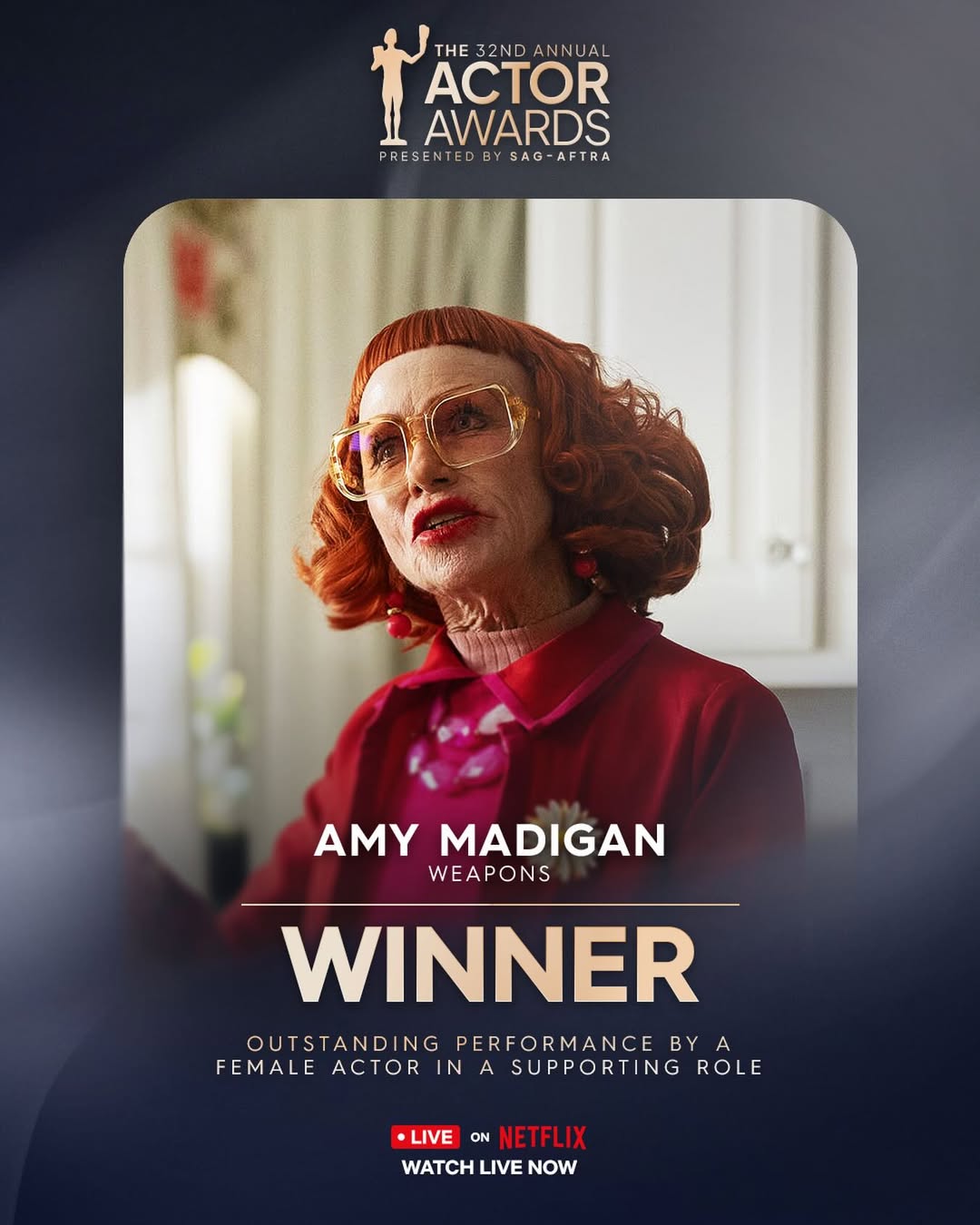
One of the biggest headlines out of last night’s Actor Awards (formerly known as the SAG Awards) was Amy Madigan winning best supporting actress for her work in Zach Cregger’s hit horror comedy Weapons.
As she stepped on stage during the last major televised ceremony of the season — a crucial platform as Oscar voting continues through Thursday, March 5 — Madigan charmed her fellow actors and peers, shouting out fellow Weapons actors Julia Garner, Alden Ehrenreich, and Austin Abrams and remarking on how “actors love other actors.” In a moment where she would’ve been completely justified to simply relish in personal victory after working at her craft for 45 years, Madigan turned the spotlight on the collaborators who made her remarkable transformation as Aunt Gladys possible.
As she finds herself on the cusp of Oscar glory, Madigan is also on the cusp of breaking through the Academy of Motion Pictures Arts and Sciences’ historic bias against horror performances (remember Toni Collette in Hereditary and Florence Pugh in Midsommar?) But it’s that same bias that could keep the Field of Dreams actor from going all the way.
Last year, best actress frontrunner and The Substance star Demi Moore lost the Oscar to Mikey Madison in the best picture winner, Anora. Moore won major awards at the Critics Choice, Golden Globes, and Actor Awards, while Madison won at the BAFTAs and Spirit Awards. The Substance certainly tested Oscar voters more with its ultra-shocking body horror, but Madigan’s trajectory with Weapons hasn’t been too far off from Moore’s — she’s a veteran actor finally getting her dues for an out-there horror performance in an even more out-there film. You could argue Madigan has the most identifiable career narrative of the season, and she gave one hell of a memorable performance that instantly went viral.
She’s been here before; in a fitting full-circle moment, Madigan received her first and, to date, only other Oscar nomination exactly 40 years ago for 1985’s Twice in a Lifetime, an indie drama starring Gene Hackman, Ellen Burstyn, and Ann-Margret (Madigan was the sole nominee for that film). The Oscar-winning group that Madigan hopes to join come March 15 is comprised of Jodie Foster and Anthony Hopkins for The Silence of the Lambs, Kathy Bates for Misery, Fredric March for Dr. Jekyll and Mr. Hyde, and Ruth Gordon for Rosemary’s Baby. A small group, but mighty company for the lucky actor who joins it next.
Madigan’s trajectory has already been compared to Gordon and Rosemary’s Baby, and rightly so — Gordon won the supporting actress Oscar in 1969 on her second acting nomination, while box office hit Rosemary’s Baby was only nominated for one other award (best adapted screenplay). Weapons was an undeniable summer sleeper hit, grossing $269 million worldwide and earning a coveted nomination from the Producers Guild of America, yet Madigan was the only part of the film to be Oscar-nominated. Her two main competitors, which include BAFTA winner Wunmi Mosaku for Sinners and Golden Globe winner Teyana Taylor for One Battle After Another, have the benefit of being in best picture frontrunners with 16 and 13 nominations apiece. Those films also have top-of-the-line visibility from distributor Warner Bros. Pictures.
With the uncertain state of the supporting actress race so far, Madigan has history going both for and against her; the past six Actor Award winners for supporting actress, most recently Zoe Saldaña for Emilia Pérez and Da’Vine Joy Randolph for The Holdovers, all went on to win the Oscar. But those six actors were in films with multiple Oscar nominations, including best picture, and four of the six swept all the major precursors. Notably, the last time the Actor Awards mismatched with the Oscar supporting actress winner was in 2019, when Emily Blunt won for A Quiet Place (she wasn’t even nominated for the Oscar!)
As the sole rep of her film in a fractured category, Madigan has more odds stacked against her. One could also argue, though, that Madigan being the sole nominee of her film means all the campaigning has been able to strategically focus on getting her the win. Whether she prevails at the Oscars or not, she’s certainly had a blast on the campaign trail, enjoying the likes of Oscar winner Sally Field and Emmy winner Hannah Einbinder hosting Weapons screenings, tastemaker events, and Q&As over the past several months.
Madigan’s performance as Aunt Gladys has resonated with horror fans for skillfully playing the character’s terrifying turn from chatty neighbor to demonic hair-splitting killer, while the LGBTQ+ community has embraced her entire look and ethos. Aunt Gladys costumes could, predictably, be seen everywhere on Halloween, and she’s become an unstoppable inspiration for drag artists and performers. In a recent interview with Turner Classic Movies, Madigan even noted Bette Davis and What Ever Happened to Baby Jane? as a major inspiration for Aunt Gladys’ makeup and look.
Madigan told Rough Draft Atlanta in November, “I think in that realm – as someone who was bullied a lot as a kid – whenever you see characters like Gladys being proudly themselves and loud and open, there is something that resonates [with] the queer community and everybody, because that is what people want – the courage to be themselves.”
Madigan was in good company last night, with Sinners aiming to continue making history for horror cinema after its record-breaking 16 Oscar nominations. At the Actor Awards, Michael B. Jordan won best actor and the film’s ensemble took the top award, while Mosaku won best supporting actress at the BAFTAs. Jacob Elordi, who won best supporting actor at the Critics Choice Awards for Frankenstein, is nominated at the Oscars as well.
Not all these actors are odds-on favorites to win their respective categories, but 2025 horror performances have already broken through with Academy voters in the nomination stage. It wasn’t too long ago when millions of people watched Weapons in a crowded theater and discovered Madigan’s transformative talent for the first time, with some immediately writing her off from the Oscar race based on historical precedent. It’s only fitting that Aunt Gladys and the chameleon actor who brought her to life continue to prove us wrong.
a&e features
Taylor Tookes wants you to be your own beauty standard
This queer model wants her fans to be larger than life — even if they’re only 5’1”
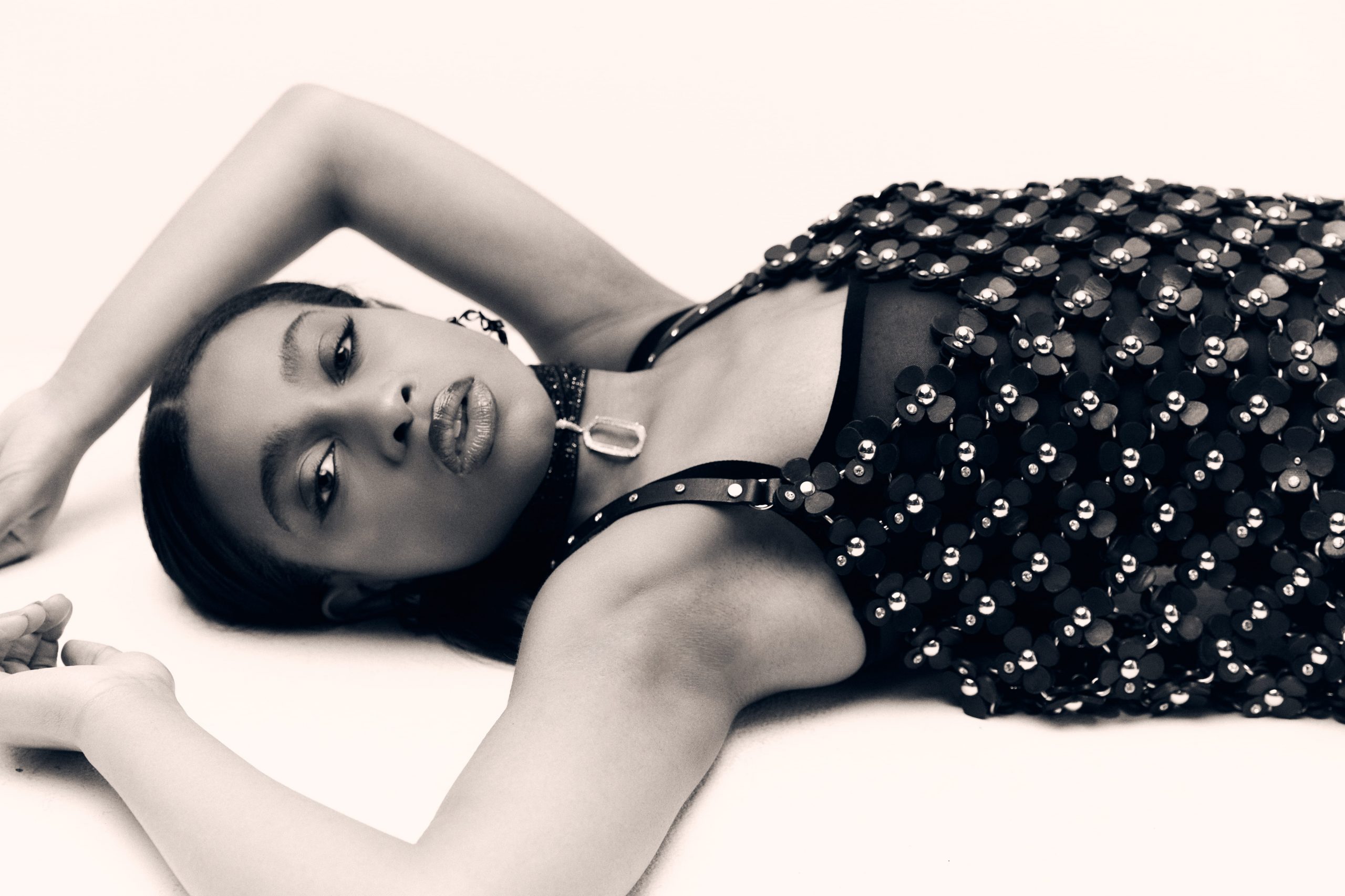
There’s a certain truth when it comes to the fashion industry: it’s absolutely brutal.
It’s undeniable how much fashion drives culture; from the clothes folks wear to the influencers taking over social media, this endlessly complex business determines so much of your average person’s day-to-day life. With this being such a gargantuan industry, it’s no wonder why it’s so difficult to be a successful model — especially if you’re marginalized! While recent years have seen a welcome increase in LGBTQ+ models, models of color, and models who don’t fall into your typical beauty standards, it’s still immensely difficult for someone who’s ‘different’ to make it in fashion today.
Which is what makes Taylor Tookes so unique.
Standing at a proud 5’1”, this queer woman of color has spent the past few years dominating fashion in a way most models could only dream of. From making history as the first “short” model in New York Fashion Week to recently being named Glamour Bulgaria’s Woman of the Year, her accolades haven’t stopped rolling in since she began modeling a decade ago. But despite this, she detailed how much rejection she still faces today, with so many people (in and outside of the industry) using her identities to discredit her many years of hard work. It’s a constant negativity that can easily get someone down, but for Tookes, she just has one thing to say: “I really don’t care.”
“What really made me want to pursue [modeling] as a career was rejection, and hearing the word ‘no’ a lot,” Taylor explained. “I thought it was the dumbest thing ever!” She detailed the countless rejection letters she received early in her career, with a majority of them blaming their dismissal on the model’s height. “There’s a side of [this] industry that embraces all of my identities, but there’s also that side that’s like, ‘You shouldn’t be here. Why are you here? You’re too short. You’re too this. You’re too that!’” These questions are ones that Taylor has heard from the first few days of her career up until now, with many still questioning her role even after appearing in numerous legendary magazines. But Tookes doesn’t let this negativity get her down! She is constantly optimistic and embraces a positive outlook…one that anyone who’s been online has seen before.
Since childhood, most people who’ve consumed any aspect of American media have encountered the mantra of ‘’You’re beautiful just the way you are.” It’s an uplifting message that can be indescribably hard to follow; it’s easy to say “love yourself no matter what” when you aren’t bombarded by oppressive beauty standards or the stress of a 9-5 job. Even more, for queer people, it can be so difficult to focus on how amazing you think you are when there are so many others trying to convince you otherwise. Because of this, our communities have been at the forefront of calling out ‘toxic positivity’ and its unhealthy effects on influencers who haven’t known strife, chiding others for not being as effortlessly confident as they are.
With Taylor’s nonstop ambition and optimism, it can be easy for people to dismiss her mentality as this distinctly cheery brand of unrealistic. But anyone who actually speaks with the model understands that this confidence didn’t come easy — it’s one she’s fought to have in spite of the countless people who told her she shouldn’t.
Throughout the conversation, Taylor spoke about the many years when any one of her identities excluded her from the spaces that taller, straight models could access easily. Yet she described these moments not with sadness, but with verve. “It doesn’t really affect me in any negative way. I would say it falls under the ballpark of rejection for me, which just pushes me to keep going.” She is not someone who had this career handed to her. Taylor has proven herself as a hard-working person who faces adversity every day online, but recognizes that it all comes from people who don’t matter because they aren’t her.
“You kind of just have to remove your perception of yourself from other people’s perception of you…because really, the only perception that matters is your own. What you think of you is the only [opinion] that matters.” It’s a mantra that would sound hollow from a person who hadn’t faced hardship before, but that gains power coming from Taylor. But she knows that this hard-fought mentality isn’t easy for everyone to, which is why she fights for her communities both on and off the runway. “Representation is really important [to me]….to see someone like yourself in the industry out there like you. So you can have the mentality of, ‘Hey, if they can do it, I can do it too.’” Along with breaking barriers, recent years have seen Tookes begin advocating for fresh faces in not only fashion, but media as a whole. She and fellow model Victoria Pousada recently began The Starter’s Block, an organization dedicated to amplifying indie projects and helping independent talent like they once were to find their place in the film industry.
As the conversation came to an end, Taylor Tookes emphasized that she may be one of the first short, queer women of color to conquer fashion — but she won’t be the last. She urged anyone with her identities to join her on the covers of magazines, to be brave and try while remembering that rejection is just fuel in the fight to follow your dream. And for those who may not want to walk a runway but just want to feel beautiful in a world constantly telling them they’re not, Taylor advises them to say what she tells herself whenever she feels down.
“I just remind myself: Don’t listen to them. You’re that girl…I remind myself of who I am, why I’m here, and what my mission is. [I just need] my own validation — and no one else’s. It all depends on me.”
a&e features
Revry Co-Founder Damian Pelliccione on why we need ‘King of Drag’
The co-creator of this hit series speaks about its impact — and what fans can expect from season two!
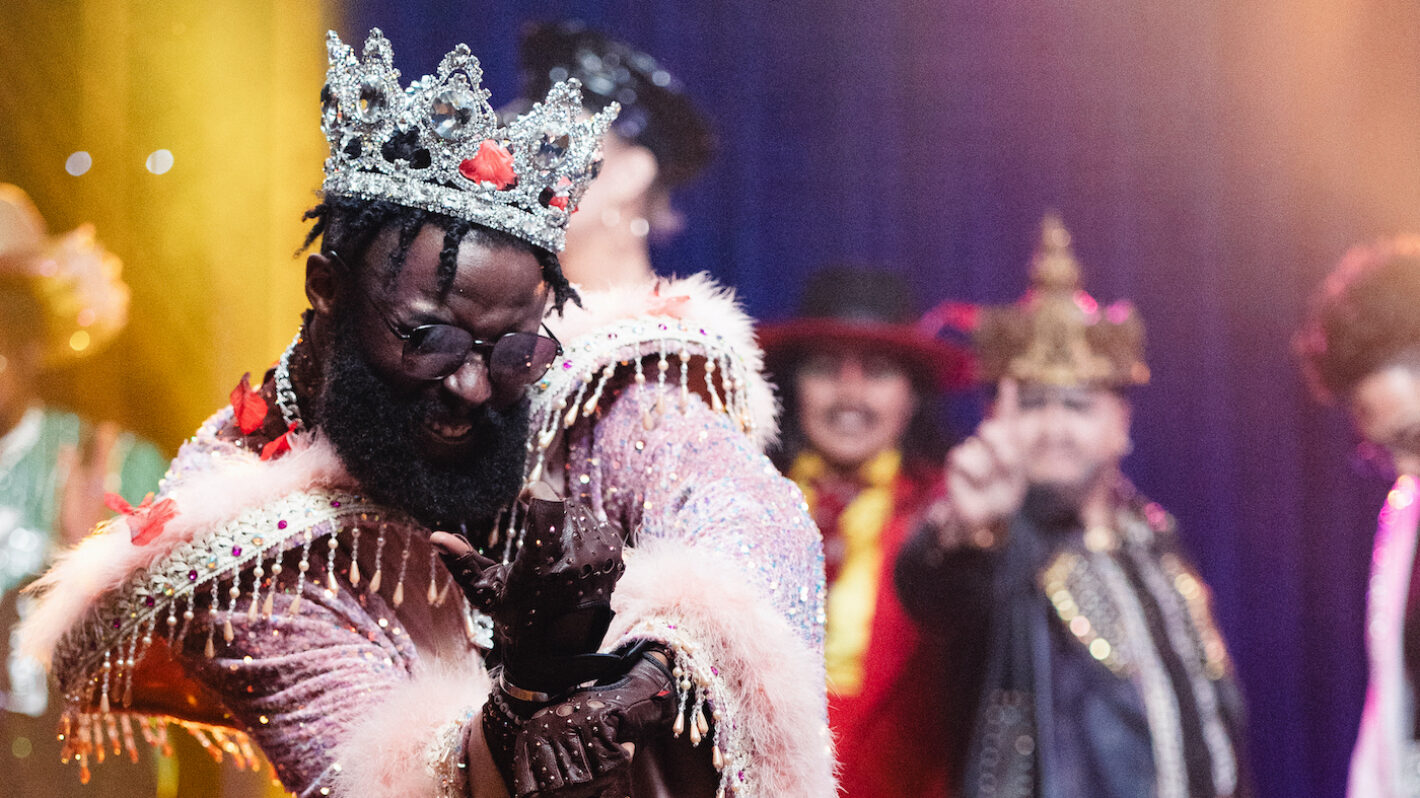
King of Drag, the only drag king competition show on TV, activated the LGBTQ+ community with a big bang, and it’s clear why. Despite an increase in drag-centric media, this was the first series deliberately focusing on spotlighting these kinds of artists. Even a year after its premiere, fans are still raving about the show, with season one delivering a level of kingly charisma nobody could’ve expected — making it all the more exciting when it was announced that King of Drag was officially casting for season two!
As co-founder of Revry — the LGBTQ+ streaming service that hosts King of Drag — and co-creator of this hit competition show, Damian Pelliccione understands the power that media has on its audiences. It’s why they work every day to create LGBTQ+ content anyone can enjoy, and it’s why they fought to get King of Drag televised and ensure it was a space where kings could finally be celebrated. Sitting down with the Los Angeles Blade to discuss the series’ season two announcement and what it’s meant to be a part of such a trailblazing franchise, they started this interview by making one thing very clear: “We’ve always been fully invested in casting and promoting Drag Kings on our shows.”
The co-founder spoke about how representing marginalized identities has always been an integral part of Revry’s mission. “We’ve always been very inclusive in our casting to make sure that we [work with] kings just as much as we work with Queens.” It’s a sentiment that, unfortunately, most other drag-centric series don’t share. RuPaul’s Drag Race, especially, has been criticized for refusing to cast anyone who wouldn’t fall under the umbrella of ‘queen.’ And while subversive programs like The Boulet Brothers’ Dragula do allow drag kings to compete, the show typically only allows one or two each season, meaning that there’s only a short time to discuss the boundless intricacies that exist in this art form.
This means that while drag king representation exists, it’s only been a trickle amidst the wave of awareness that drag queens have received in recent years. This phenomenon never sat right with Damian and their Revry team — so they decided to do something about it.
After years of searching for sponsors to get the show made, King of Drag officially premiered in June 2025 to widespread acclaim. Fans were instantly taken by the bombastic competition; while its format is similar to many other series’, the hilarious judging panel (led by the amazing Murray Hill) and jaw-dropping challenges were endlessly zany while also perfect avenues for contestants to show their immense talent. Almost growing emotional, Pelliccione recounted the widespread support the series received after its first few episodes, saying, “[Viewers] come forward to say, ‘Thank you for creating something that is not just about fighting or cattiness.’ It’s an elimination show, but you could see the authenticity in the heart of these kings…you could see their struggles, and [what it took] to create their art.” They fondly described the love this project hasn’t stopped receiving since it first came out — but they also detailed the rampant hatred that has come along with it.
It shouldn’t be forgotten that King of Drag was produced and aired early into the current presidential term, with the early months of 2025 seeing a level of anti-trans and homophobic rhetoric filling the U.S. in a way many viewers had never seen before. Damian recalled how, in the face of this hatred, their team understood that audiences needed King of Drag now more than ever. “It’s somewhat an act of defiance having a show like King of Drag — and having a network like Revry [altogether],” they said, filled with pride. “You can’t stop progress, and we’ve already come so far as a society (at least, I hope we have), so going back does not seem realistic. And I think that we’re seeing resistance now to our sitting government, and hopefully this carries into our midterm elections!”
A resistance that was buoyed by King of Drag, with each episode introducing viewers to nonstop drag excellence and thoughtful conversations on what it means to be a queer artist today. This, combined with the wild challenges — ranging from queer quiz shows to boy band performances — turned the initial installment into a raucously prideful experience for everyone watching. For almost a year now, fans have applauded all that the show was able to accomplish, and Damian assures these viewers that there’s even more coming in season two.
“Some of the biggest things we’re really excited about in this season are [not only] a few returning challenges, but we are [also] really bringing on a whole new level of celebrity guest judges,” raved the excited co-creator. “We’re really tailoring our [judges] so that they could be a kind of mentor or advisor. [Helping] build something that the king can use for their future career!” It was this point especially that Damian emphasized as the heart of King of Drag, recognizing that while having your time in the spotlight is amazing, bills still need to be paid when the cameras are shut off. “I want kings who come off our show booked and blessed. What else can we do as a network just to help support those careers?’”
With the interview coming to an end, Damian was asked the question that thousands of drag kings are currently thinking: how can I get cast? Typically, producers answer this style of inquiry with vague advice about uniqueness and skill — but not Damian. Still wanting only the best for their contestants, they plainly stated, “My one word of advice: this is not a side hustle.”
“The purpose of being on the show is to create a career for you…We want people who are really serious about the art form and have their own specific take on what it is to be a drag king. We want your authenticity, and we want to see that this is a career path for you. We [want to know] that this is something that you’re ready to take to the next level.”
An ambitious yet thoroughly uplifting goal for the many kings currently getting their applications together. And with that advice, the creator made one thing very clear: King of Drag exists not only to spotlight drag kings, but to bring them and their art form to the forefront of queer entertainment. It’s a revolutionary undertaking that viewers can watch unfold in each scene, and if a drag king feels ready to join in and become a part of this mission, Damian invites them to gather up their best drag and apply for season two today.
King of Drag season 1 is streaming on Revry
a&e features
‘Pee-wee as Himself’ and ‘Lurker’ directors on how queer audiences have reacted to their Spirit Award-winning films
“It’s been revelatory for young people,” Matt Wolf said of telling Paul Reubens’ coming out story

This year’s Film Independent Spirit Awards winners told wide-ranging stories of everything from Paul Reubens’ posthumous coming out in Pee-wee as Himself to a fictional homoerotic relationship that forms between an artist and his biggest fan in Lurker.
With such a diverse group of winners, these filmmakers reflected on how queer people and young audiences have responded to their work.
“I’ve talked to people whose kids have seen the film, and young kids don’t understand what the closet is,” Pee-wee as Himself director Matt Wolf told The Blade backstage. “As a younger, gay filmmaker, I felt like I could help him do that on his own terms. It was a big deal for Paul. It’s interesting to hear from people’s kids who don’t understand the struggle.”
Wolf continued: “It’s been revelatory for young people in that sense, but also I’m hearing from people that their kids are now watching Pee-wee’s Playhouse, and that they love it. And you never know, does this thing look old? Does it feel outdated? [His films are] so otherworldly, and I don’t think young people register it as being from any time.”
Lurker director Alex Russell (who previously wrote on Beef and The Bear) nabbed awards for best first screenplay and best first feature, and Théodore Pellerin and Archie Madekwe were nominated for their performances. Russell’s win is a testament to Film Independent’s legacy of embracing new generations of filmmakers and storytellers.
While accepting the award for best first screenplay, Russell recognized the creatives who took a chance on him, saying: “I want to thank everyone who was willing to look stupid and put even just a sliver of themselves on the line to legitimize all these new filmmakers here tonight, who, without you, would still be aspiring to make their first movie.”
Backstage, The Blade asked the breakthrough filmmaker about how queer people have responded to the film’s thorny take on male relationships.
“I don’t know if the queer community has reacted to me personally. There’s an interesting discussion in what Matthew and Olivier’s relationship is all about … and where they stand on the spectrum,” Russell said. “I want people to think about that, I want people to think about the ambiguity of that. That being said, if the queer community wants to talk to me about it, I’m here!”
Pee-wee as Himself is available to stream on HBO Max, while Lurker is on MUBI.
a&e features
Liveplay series ‘Gladlands’ finds hope in the unlikeliest of places
The cast of ‘Dimension 20’s’ latest season discusses bringing chaos and community to their many loyal fans.
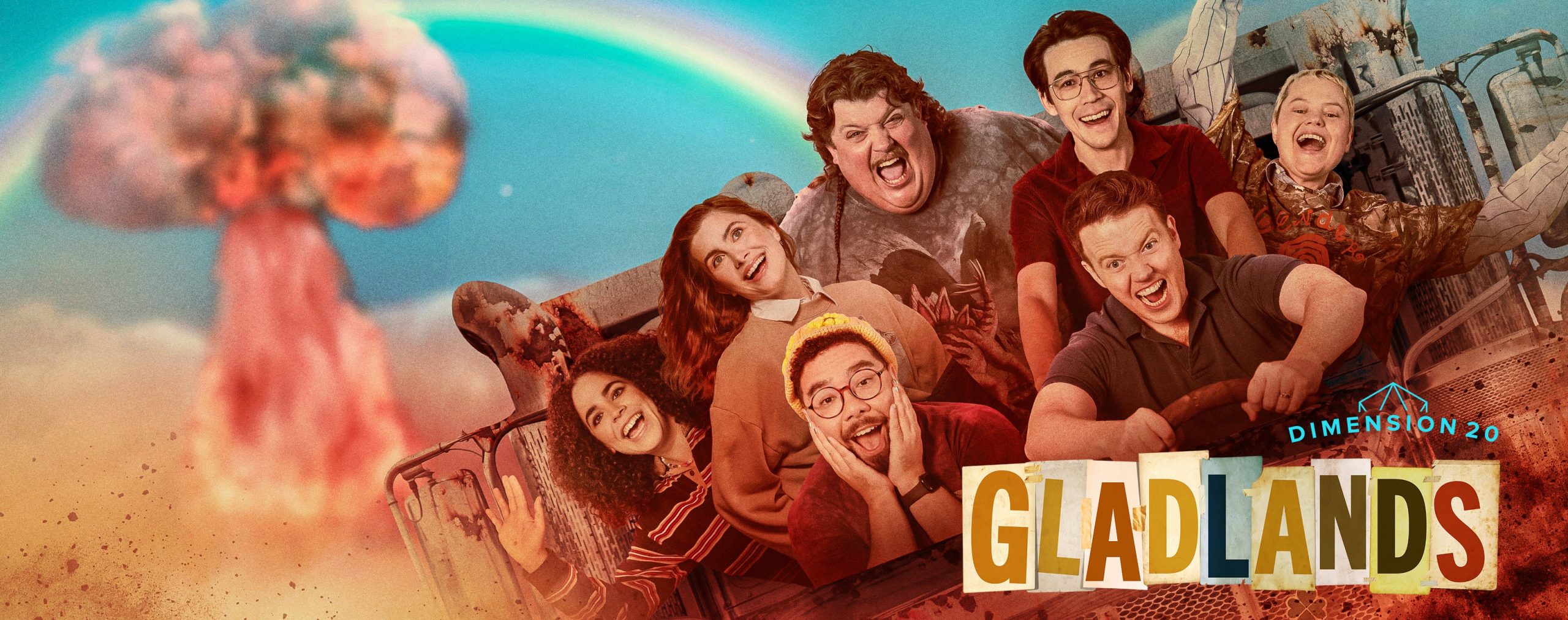
Sometimes, it takes everything falling apart for us to remember that community is what holds us together.
It’s a lesson that many people have learned in recent months. Amidst the ongoing attacks against LGBTQ+ and immigrant populations, folks across the country have come to realize just how important community is to each of our daily lives.
Now more than ever, marginalized communities need to remember that oppressors have always used grief to further disenfranchise the people they’re attacking. And that, as laughable as it seems at times, the best response to others’ hatred is to love one another; to foster strength and joy amongst our own groups to ensure we have the fortitude necessary in the ongoing fight against bigotry. Many projects have tried to remind folks of this message…and one just so happens to be a tabletop roleplaying game (TTRPG) set in a post-apocalyptic — and so, so queer — wasteland.
Gladlands is the latest season of Dimension 20, a renowned TTRPG liveplay series that sees groups of LA-based performers tackle some chaotic new narrative every season. The show’s newest installment takes place in a barren wasteland, with all cities and symbols of civilization reduced to rubble after a multi-year ecological crisis (which just so happens to resemble the one we’re currently fighting right now). The cast, which features a majority LGBTQ+ group of LA-based comedians, plays a team of folks trying to help as many people in this hellscape as possible, reminding every survivor they come across that it’s easiest to get through the hard times when we’re in them together.
The cast of Gladlands sat down with the LA Blade to discuss this poignant message and how it feels to deliver it when folks need it most. They speak about their roles in the series, their personal lives as local artists in Los Angeles, and how it’s fun pieces of media like this that can get folks through the toughest times. They raved about this complex project and what they hope it will bring to everyone who watches, with each player emphasizing Gladlands’ core message: you are not alone.
As strange as it may seem to people not in the community, it’s not uncommon for role-playing games like Gladlands to touch on issues real people struggle with every day. “It really is transformative,” said Oscar Montoya, who plays the fierce Drag Queen librarian ‘Poppy Persona’ on the season. “There’s a little bit of your soul that goes into every character that you play…and there’s so much self-realization that comes when you play TTRPG that you [may not] even recognize!” It’s a sentiment that fellow player Kimia Behpoornia, who plays the skateboarding cockroach-human hybrid ‘Tess Tube5,’ echoed, stating, “[These games] help people feel so validated.”
The cast reiterated how it’s these sessions of fantasy that often allow people to grow in very real ways. That’s why they believed it was the perfect platform to spread the message of love threaded throughout Gladlands, a season that sees their group of apocalyptic advocates — members of the legendary ‘Carer-Van’ — drive across an endless desert in search of anyone who needs help. An eclectic group of humans and mutants, each episode sees them work hard to see the good in their fellow person and flex their many skills to assist those in need.
“It’s really nice that this season is here [during a time] when it really resonates,” Kimia went on. “But it’s kind of the simplest idea [ever] to want to help your community!” Vic Michaelis, whose plague mask-wearing character ‘Hugi’ is the apocalypse’s only mortician, stressed that the show’s message is one that everyone needs to remember right now. “We’re living during a time [when] community is very important…but there’s no way [when we were filming] that we would’ve known the season would come out at a time like this. But [we are] watching people dig down right now and go, ‘We are taking care of our community.’” They reminded everyone watching that this kind of communal care is not only inspiring, but also threatening, saying, “That strikes fear amongst people in power. There is success in coming together to protect your community, [which I think] reflects the themes of Gladlands.”
“Trying to stay glad is, in itself, a form of resistance,” Agreed Jacob Wysocki, who portrays the warm and cuddly caretaker KoKoMo. He detailed how, through their characters, each player hoped to offer viewers models of the many behaviors that allow real communities to flourish. On that in particular, he gave credit to the season’s dungeon master, Brennan Lee Mulligan, saying, “He built this world because he looked at the [real] world we’re in and [asked], ‘Does it take a fully post-apocalyptic world to get to a space where community [comes] first?’”
“Baby — we live in the post-apocalyptic times right now!” Said Montoya, whose time as a Los Angeles activist has given him special insight into how this city’s communities have been struggling. “[But] I think the important thing to realize is that we create our own Gladlands…the message of community coming together to combat adversity is so paramount, especially right now. To have a collection of people you can lean on and say, ‘We don’t like this. We don’t stand for this. Let’s create something together.”
Each cast member agreed that, while a lovely sentiment, the messages broadcast through their show are easier said than done. But they each emphasized that you don’t need to be part of a roving band of super-powered caretakers to do good — and that no matter what, this kind of work should never be done in solitude. “[Remember] you’re not in it alone,” emphasized Montoya, as the interviews came to an end. “You are a part of a community that can enact change. And know: they’re trying to take that away from us. They’re trying to make us feel smaller and less than. [But] you have to recognize that we have the power…especially when it feels so overwhelming. Because it is then that you have people who have your back, who will continue to have your back [no matter what].”
An uplifting message of community, wrapped up in a chaotic season of jaw-dropping dice rolls and truly wild character arcs. Gladlands showcases that, sometimes, the most important lessons come in the most surprising packages. And, with each of these performers at the helm, it highlights the core message of this series as a whole: you’re never alone in the fight for community. And true freedom starts with being there for your neighbors, making sure that you all have what you need for whatever may come next.
a&e features
Tello Films: Celebrating 19 years of lesbian storytelling
Tello Films proves that, after 19 years, independent lesbian filmmaking is as necessary as ever.
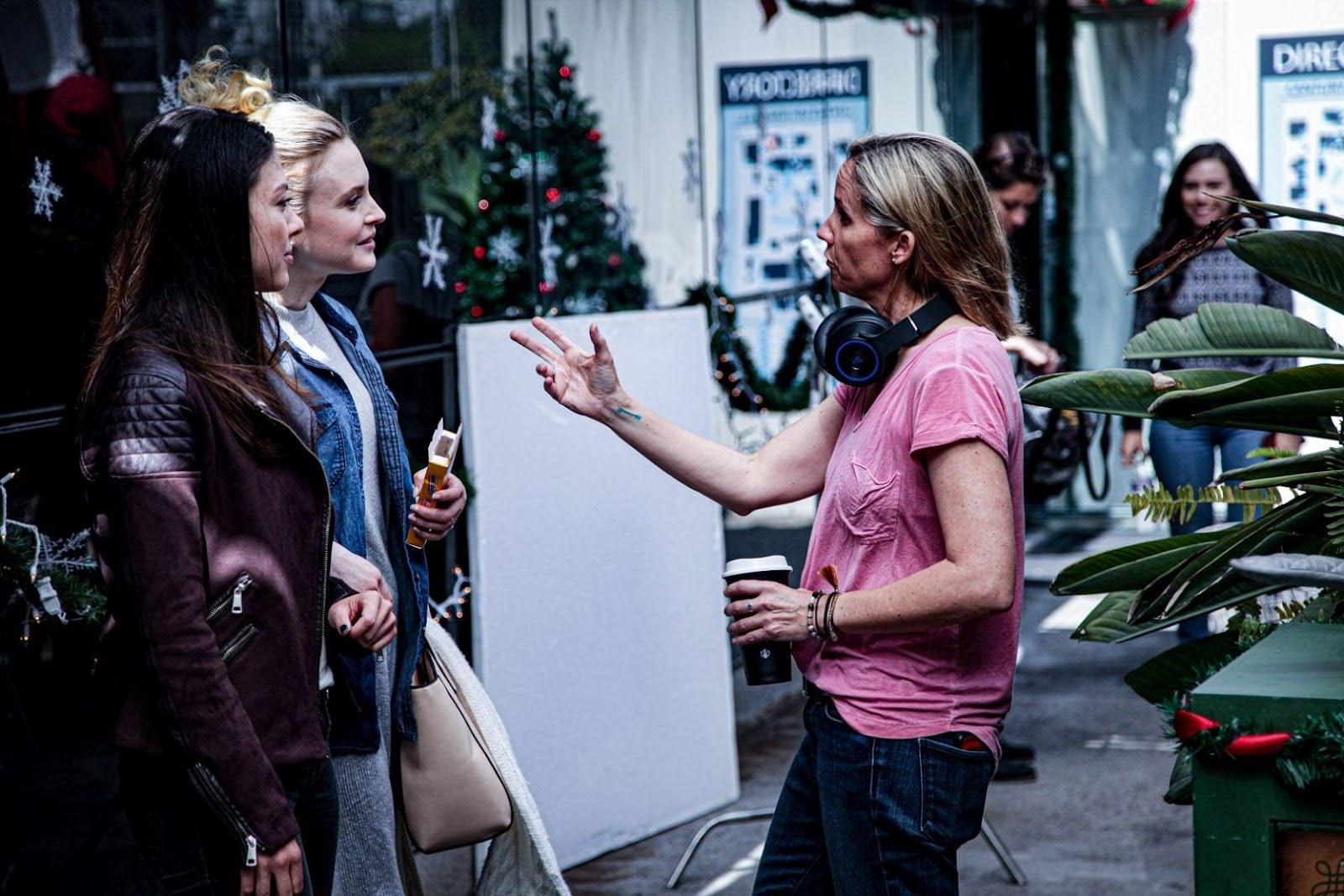
In an era where LGBTQ representation in movies has hit a three-year low, Tello Films proves that, after 19 years, independent lesbian filmmaking is as necessary as ever. According to Sarah Kate Ellis, the CEO and President of GLAAD, “Nearly ⅓ of non-LGBTQ Americans say that LGBTQ inclusive films have changed their perception of our community… It is imperative that networks and streamers do not back down.”
Meanwhile, the lesbian streaming service Tello Films celebrated its 19th birthday on February 6th. Says founder Christin Baker, “When I started it 19 years ago, I thought at some point maybe we wouldn’t be necessary, […] I really do feel like representation saves lives…it’s still important for us to be around.” Often referred to as the “Lesbian Netflix”, the Nashville-based production company has a primary focus on lesbian and sapphic stories for the past 19 years and thankfully, is just getting started.
Tello Films was far ahead of its time. For those of you who didn’t live through or don’t remember, 2007 was a different time. Apple debuted the first iPhone, Barack Obama declared his run for the presidency, and the phrase “that’s so gay!” was prevalent as ever (at least at my high school). “We didn’t have marriage equality at that time. Civil unions were kind of starting here and there -the crazy thing (is that) ‘Don’t Ask Don’t Tell’ was still in effect.” Baker recalls, “There were still so many rights we didn’t have in 2007 when we started it, and we are still fighting for it.”
Tello Films’ beginnings were just the start of the lesbian legacy. Said Christin, “I never thought Tello would or could ever be my full-time job.” With the URL TelloFilms.com registered on February 6, 2007, the platform was an internet-based streaming company with all its movies formatted small to appease a 2007-era browser. While Netflix was only just beginning to offer streaming services, launching any streaming service in 2007 was bold; to launch a streaming service entirely devoted to lesbian and sapphic stories was revolutionary. “I want to make lesbian stories.. I want to see things that represent me.”
In the past 19 years, Baker shares her career-defining moment came from the recently deceased Nancylee Myatt, showrunner for South of Nowhere. “We made a short-form series called Cowgirl Up. I felt like I put my big girl pants on. Nancylee was a huge mentor, and I was like, ‘Oh, I can do this. I can do this, and I can figure it out.’”
Tello went on to receive their first primetime Emmy nomination with Mindy Sterling of Austin Powers fame for Outstanding Actress in a Short Form Comedy or Drama Series. “We got two daytime Emmy nominations for two actresses, Liz Vassey and Carolyn Radere […], then in 2018 we made our first lesbian Christmas movie,, Season of Love and that really kind of started us down the path, and I think we’re probably most well known for, which is our lesbian holiday rom-coms.”
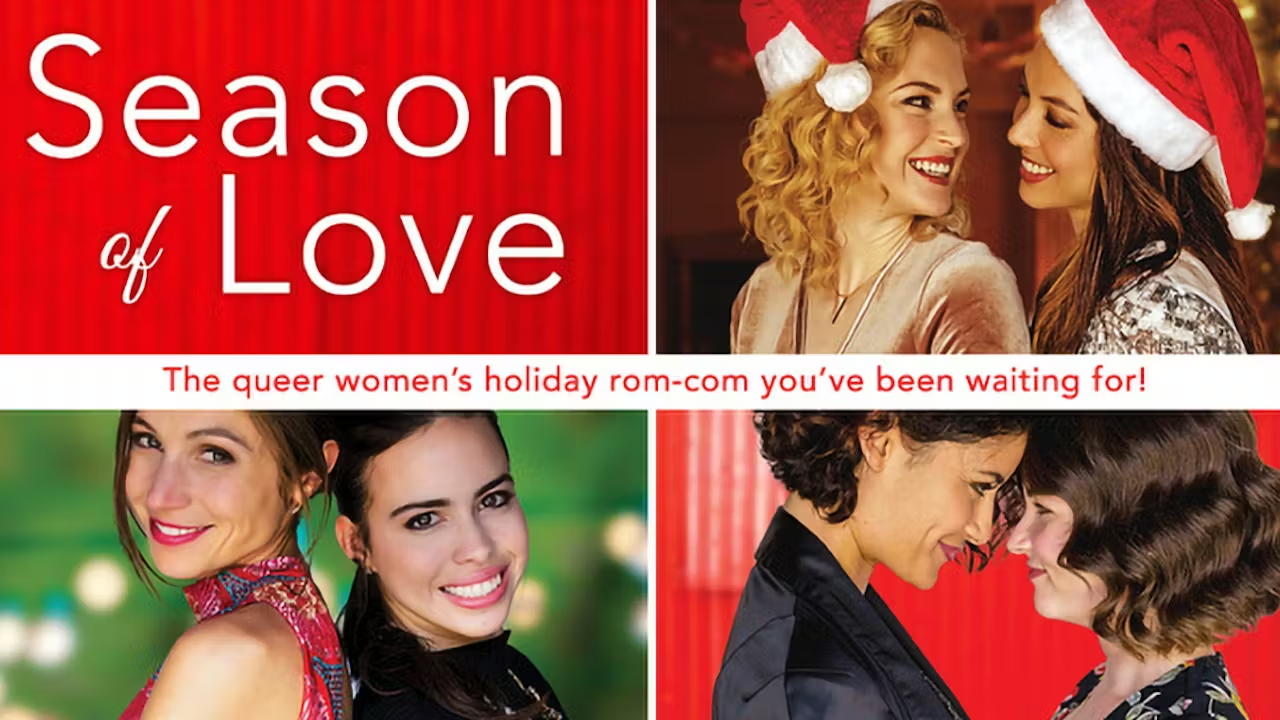
We now live in the era of Chappell Roan, Doechii, Heated Rivalry, and so many more queer artists and pieces of media in the mainstream’s consciousness. The last several years in pop culture have proven that queer art and artists matter, not just as a salve to a society that still struggles to accept us, but to the mass audiences who continue to resonate with it.
Queer media is being devoured by folks outside of the LGBTQ community. “I think it (Heated Rivalry) shocked so many people (because) it was powerful and compelling […] I wasn’t that surprised because I remember Brokeback Mountain being very much in that same vein; it was just cowboys instead of hockey players.” Authenticity and overcoming adversity are not just tenets of good storytelling; they are also ever-present themes within the lives of any queer you know.
As Christin sees it, the success of Heated Rivalry isn’t just rooted in its unabashed sexual themes, it has a very universal “lesbian” approach to its storytelling “There’s a ton of longing, and missing, and having a crush and not knowing if it’s reciprocated, […] there’s a lot that you tap into just on a human level that Heated Rivalry really touched on.”
Themes that are at the forefront of the sapphic stories Tello has mastered telling. “We still don’t have enough LGBTQ holiday Christmas movies out there each year. Some people wouldn’t look at a Hallmark movie or Christmas rom-com as substantive, but I really do feel like representation saves lives.”
For so many in the LGBTQ community, representation isn’t theoretical- it’s personal. I know for myself, in the throes of a messy divorce, one of the only things that brought me comfort was the sapphic films on Tello. It was so difficult to find lighthearted queer stories. I recall searching through every streaming service as they were slowly but surely eliminating the LGBTQ sections from their apps, as well as those queer characters and shows. But not Tello; I was able to find comfort and ease through a tough time in my personal life. “It’s such comfort, especially if you’ve gone through something that’s tough and your regular daily life is stressful, you need an escape to something that you know is not going to cause more anxiety.”
Having accessible ways to both tell and consume sapphic stories is tantamount to this moment in time. Independent filmmaking has the power to make sure authentic stories are heard. Being an independent voice as well as being able to support smaller budget stories that definitely wouldn’t get picked up, or even recognized or seen in mainstream, Christin and Tello Films are uplifting not just lesbian and sapphic stories, but lesbian and sapphic artists as well.
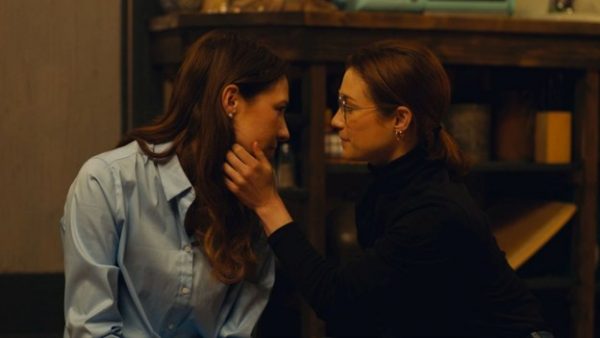
As for the future of lesbian filmmaking, it’s no secret that Hollywood is drowning, leaving a void for people like Christin and Tello Films to fill. Said Baker in light of the shrinkage in Hollywood and what that means for Tello Films, “We will get even more creative and tell even more stories, because we can’t be stopped.”
Encouraged by her fiancée, Stacey Lee Powell, Christin wants the world to know that Tello Films isn’t just a business, it’s personal. “I see Tello as an extension of me.” Says Baker, “In doing that, I hope that people see that Tello isn’t some corporate entity, I hope they see that it is someone who cares deeply. I’ve been doing this for 19 years, and every day I wake up trying to figure out how to tell our stories and how to serve our community.” Nineteen years later, Tello Films remains what it has always been: not a nameless, faceless corporation, but an extension of a storyteller’s dream to build a safe space for her community.
Check out TelloFilms.com
a&e features
From ‘So Random’ to sexy theater: LA’s very own Mathew Scott Montgomery
This former Disney star breaks down their new play, ‘Foursome,’ and the security of performance.
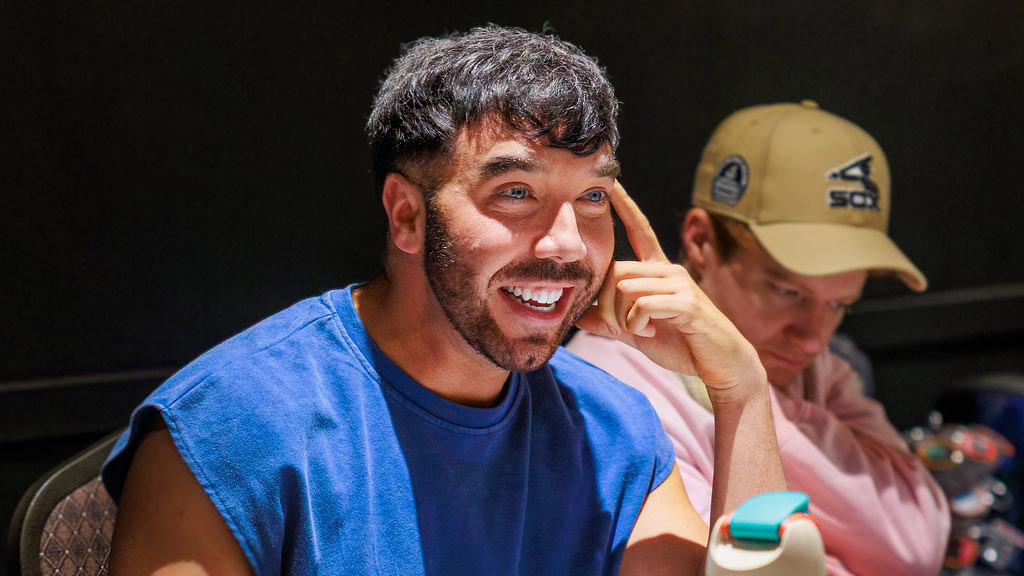
Even in a Los Angeles filled with experimental theater, few projects have been as brazenly sexual as the IAMA and Celebration’s Foursome. Following a quartet of queer friends as they embark on a weekend getaway, this play watches as they uncover the secrets (and attractions) that have always lurked in the shadows of their longtime friendships. Filled with niche community references, heartfelt vulnerability, and some of the spiciest live sex scenes audiences will ever see, Foursome is proving itself as an innovative look into queer sexuality — and none of it would have been possible without The Disney Channel.
Matthew Scott Montgomery began his career on Disney with one goal: pull focus. He quickly found out that he was a tad too good at this; in his conversation with the LA Blade, he detailed the many times his early onscreen performances were cut down because he was considered ‘too distracting.’ From starring as an extra in Zendaya’s Shake It Up to leading the SNL-style So Random!, his childhood career saw Montgomery flexing the bombastic personality he still carries today. And while the goal of this interview was to speak with the performer about Foursome and his time with Disney, the first few minutes were spent discussing an equally important portion of the man’s life: the Hilary Duff concert he’d seen at The Wiltern the night before.
“[I’d] spent all day in rehearsals with three of the best queer actors in the world, and [then I left] to go to a Hilary Duff concert in LA with my boyfriend, as a gift from [Demi Lovato],” raved Matthew. “I burst into tears because it hit me: none of this would’ve happened if I hadn’t come out…I wish I could go back to ten-year-old me back in North Carolina and [tell him], ‘One day, you’re going to leave your gay play rehearsal, [meet up] with your boyfriend, and go to a Hilary Duff concert. And everything is going to be okay.”
Matthew remembered this little kid from a conservative hometown who dreamt of nothing more than boyfriends and Lizzie Maguire in concert. He explained that his area of North Carolina didn’t allow for any level of dramatics from young boys — something that definitely didn’t mesh with this gay child who felt safest when he was onstage.
“When I was a kid, I used to record episodes of Will and Grace [on the VCR], write down the dialogue, then go into my room and run the scenes [when everyone was asleep]…I’ve always identified as an artist, and I was desperate to perform,” said Matthew, reminiscing on his early days as an artist. “I think the safest place in the world is on stage or in front of a camera, because you know exactly what you’re going to say. You know what your lines are, which mark you’re gonna hit…everyone is watching you, and you’re being perceived, and it feels so safe. I get nervous off camera, because then you don’t have a map of what’s happening.”
Performance has always served as both a passion and a safety for the actor, with Montgomery laughing at the many years he spent acting out his favorite shows in the sanctity of his childhood bedroom. Luckily, he eventually took these skills to a giant stage most kids could only dream of: The Disney Channel.
After years of hearing the terrible experiences of so many child actors, it’s heartening to learn how validating Montgomery’s early time on TV was. He told stories of Disney gigs and fun hangouts with queer stars like Haley Kiyoko and Demi Lovato, people who he still considers close friends today. “We would talk about our queerness and how to navigate it,” he said, showing love to the tight-knit network that these closeted children created for one another. It was because of their support that he had the courage to come out in his early 20s, with this new self-acceptance allowing Matthew to take on openly queer projects and even begin writing his own — cue Foursome, his latest creation and certainly the sexiest one yet.
Foursome sees the actor as Noah, a young man whose weekend at a cabin with three friends turns into a night of revelry as loosened inhibitions lead to shocking confessions. On why he created a project centered on modern sexuality, he explained, “I think there’s a really beautiful thing about the queer community where we can love each other through different evolutions of our friendships…this play is really about celebrating that freeness, and having a very frank discussion about what it means to be a queer person in a relationship in the modern day.”
The project douses this exploration into contemporary sexuality with so much pop symbolism that it’ll be relatable for any LGBTQ+ person watching. From the pop songs our main cast sing to the community-based slang they throw at one another, the writer wanted to instantly clue queer watchers into the fact that this was made for them by one of their own. And it’s that, he stressed, that is the goal of not only Foursome, but his entire career: making other people feel seen.
“What’s most important to me is queer joy,” Matthew stated, as the conversation came to an end. “Showing queer people having a good time…I think that can be a radical thing, especially with the way the world is right now. We’re going to be gay, and we’re going to be fun, and [our goal] is to have you join us in that fun.” He promises that Foursome will be a summation of his decades-long career of making people laugh, combining his uniquely gut-busting brand of humor with an earnest discussion around how our communities form relationships outside of heteronormative ideals. He invites everyone to come see Foursome and, in its nonstop joy, hopes that by creating this kind of inclusive art piece for viewers, he’ll be imparting onto them some of the security he’s always felt onstage.
And when asked if he had any final enticements for potential watchers, Montgomery adorned the smile that he’s worn since his Disney days and stated, “Well, we do say that the title, Foursome, is a promise — and we absolutely deliver.”
Foursome will have its world premiere with IAMA Theatre Company, produced in association with Celebration Theatre. Performances are at the Atwater Village Theatre, 3269 Casitas Avenue, Los Angeles, and plays now through March 23. Tickets ($30-$45) are available at iamatheatre.com
a&e features
Angel McCoughtry, “Renaissance Woman”
Angel McCoughtry is a professional athlete. A two-time gold medalist, 5-time WNBA all-star, philanthropist, and now filmmaker.

“Renaissance Woman” is a term fit for a queen. Heavy is the head that wears the crown, but we’re in luck because Angel McCoughtry is a professional athlete. A two-time gold medalist, 5-time WNBA all-star, philanthropist, and now filmmaker, Angel has built career(s) defined by reinvention and an insistence on excellence at every turn.
Her move to take charge behind the camera comes at a time that feels anything but divine. In a time where stories like Heated Rivalry bring the heat (pun intended) one moment, while nearly half of all queer characters and stories are vanishing from TV the next, McCoughtry’s leadership behind the camera signals something hopeful: A refusal to let anyone or any story get left behind.
A WNBA legend, McCoughtry played ten years without pause, splitting her time between the W and overseas leagues. In college, she led the Big East Conference in scoring, rebounds, and steals, obliterating records, even the ones she herself set. The number one draft pick and Rookie of the year in ‘09, McCoughtry quickly became one of the best players the W has ever seen. Though she never officially retired, Angel hasn’t played in the W since 2022, when she was sidelined for an injury that she has since healed. (Ya hear that WNBA? Our girl is ready to come back!)
Being forced to step away from the game brought about a reckoning that is all too familiar to elite athletes everywhere: “Who are you when your body won’t let you perform?” Through detangling this identity crisis, McCoughtry found a new appreciation for storytelling, the stories we tell ourselves as well as the stories we tell the world. Angel’s innovative storytelling and directing style are inspired by basketball, as she likens herself to the Dawn Staley of film, adding, “When you allow your players to be free, they can play at their highest level, and that’s what I allow my actors to do.”
Inspired by her grandmother’s stories of playing ball in a time when women were not allowed to cross half court and had to wear skirts, Angel wants to empower resilient perspectives. “I can’t keep their stories hidden,” She says, “The women who paved the way.” Laser focused on bringing scripted sports films to the mainstream, McCoughtry says, “I’m looking for stories that resonate with the people, and I want to be the one to bridge the gap and bring women’s sports scripted content to the forefront.”
Through McCoughtry Entertainment, Angel wants to bring women’s sports to the forefront as well as genre-driven films, particularly sports-thrillers led by women. Her short film Bygones is now available to stream on Prime Video, with more projects in the barrel. Her feature-length directorial debut, Bolted, is on deck as her next project. I personally would love to see the gay women’s version of Heated Rivalry in McCoughtry’s hands, who says, “There’s a realness to it,” about the show, “That happens often, and it’s not talked about [..] that’s all over women’s sports.”
“I am obsessed with stories about overcoming adversity,” says McCoughtry, an apt throughline in Angel’s work that reflects the spirit of creativity and athleticism.
a&e features
Alexander Skarsgård describes ‘Pillion’ in 3 words: lube, sweat, leather
Highly anticipated film a refreshingly loving look at Dom-sub life
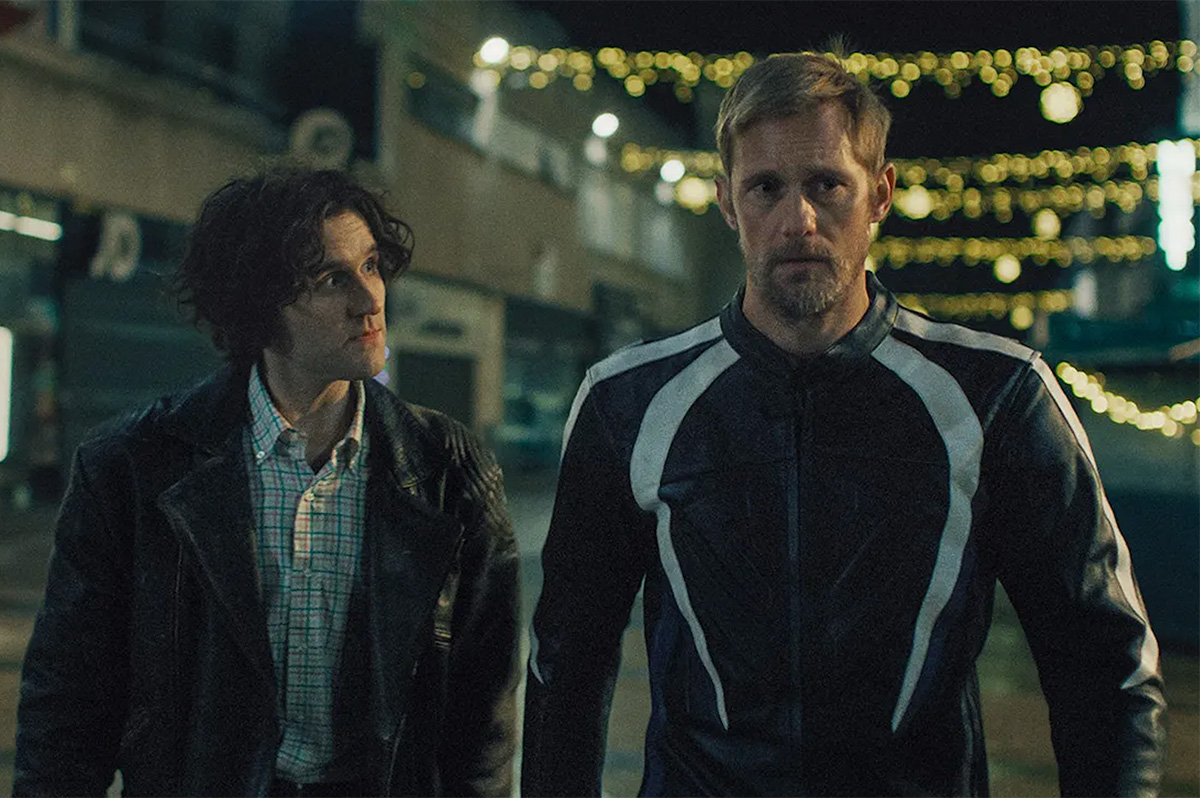
Whether you’ve seen him in popular HBO series like “True Blood,” “Succession,” and “Big Little Lies,” the dynamic Swedish actor Alexander Skarsgård has that smoldering gaze that immediately draws viewers in.
Following in the footsteps of his father Stellan, (who just won the Golden Globe for “Sentimental Value”) the Golden Globe, Emmy, and SAG winner Skarsgård continues to be an actor who is fearless in the roles he takes on.
That courageousness is evident in Skarsgård’s latest film, the BDSM black comedy “Pillion,”which he also executive produces. He plays Ray, the handsome, hyper-dominant leader of a gay bike gang. The film was written and directed by Harry Lighton, and is based on the 2020 novel “Box Hill,” by Adam Mars-Jones.
“This was a small film by a first time filmmaker and it wasn’t financed when I read it,” Skarsgård told journalists at a recent awards news conference. “And I felt that, if I could help in any small way of getting it financed, I wanted to, because I thought it was such an incredible screenplay and I believe in Harry Lighton so much as a filmmaker. And it felt tonally unlike anything I’d ever read. It was such an exciting, surprising read.”
Skarsgård was blown away by the quality of the unconventional script. “When I heard BDSM relationship, biker culture, I expected something very different. I didn’t expect it to have so much sweetness and tenderness and awkwardness.”
For the sex scenes and nudity with co-star, Harry Melling — who excels in his portrayal as Ray’s submissive Colin — Skarsgård talked very early on with Lighton about how he wanted to shoot those scenes, and why they were in the film.
“I often find sex scenes quite boring in movies because a lot of the tension is in the drama leading up to two people hooking up, or several people hooking up, as in our movie. But what I really enjoyed about these scenes — they are all pivotal moments in Colin’s journey and his development. It’s the first time he gets a blowjob. It’s the first time he has sex. It’s the first time he has an orgasm. And these are pivotal moments for him, so they mean a lot. And that made those scenes impactful and important.”
Skarsgård was happy that Lighton’s script didn’t have gratuitous scenes that shock for the sake of just shocking. “I really appreciated that because I find that when this subculture is portrayed, it’s often dangerous and crazy and wild and something like transgressive.”
He continued: “I really love that Harry wanted it to feel real. It can be sexy and intense, but also quite loving and sweet. And you can have an orgy in the woods, rub up against a Sunday roast with the family. And that kind of feels real.”
One of the obstacles Skarsgård had to work with was Ray’s emotionally distant personality.
“Ray is so enigmatic throughout the film and you obviously never find out anything about him, his past. He doesn’t reveal much. He doesn’t expose himself. And that was a challenge to try to make the character interesting, because that could easily feel quite flat…That was something that I thought quite a lot about in pre production…there are no big dramatic shifts in his arc.”
For the film, Lighton consulted the GMBCC, the UK’s largest LGBT+ biker club, attending their annual meetup at which 80 riders were present.
“Working with these guys was extraordinary and it brought so much texture and richness to the film to have them present,” said Skarsgård. “They were incredibly sweet and guiding with us — I can’t imagine making this movie without them. I’d go on a road trip with them anytime.”
Added Skarsgård: “To sum up ‘Pillion’ in three words: lube, sweat, and leather. I hope people will connect with Colin and his journey, and come to understand the nuance and complexity of his bond with Ray.”
This year is shaping up to be a busy one for Skarsgård. “Pillion” premieres in select cities on Feb. 6 and then moves into wide release on Feb. 20. After that for Skarsgård is a role in queer ally Charli XCX’s mockumentary, “The Moment,” which premieres at the Sundance Film Festival. HIs sci-fi comedy series, Apple TV’s “Murderbot,” which he also executive produces, will begin filming its second season. And this weekend, he hosts “Saturday Night Live.”
-

 a&e features2 days ago
a&e features2 days agoAmy Madigan finds herself on the cusp of Oscar glory. Can she overcome the historic bias against horror performances?
-

 Television4 days ago
Television4 days agoSexy financial drama ‘Industry’ is feeding the queer community
-
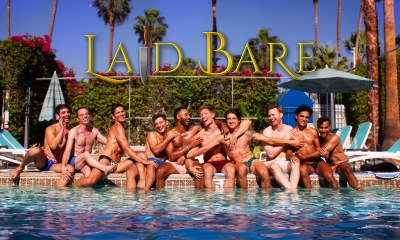
 Television24 hours ago
Television24 hours ago‘Laid Bare’ isn’t your typical sexy slasher
-

 Commentary2 days ago
Commentary2 days agoLA28: Where is your moral compass?
-

 California2 days ago
California2 days agoEquality California has sponsored 12 bills to advance LGBTQ+ rights in the state
-

 Books3 days ago
Books3 days agoLove or fear flying you’ll devour ‘Why Fly’
-
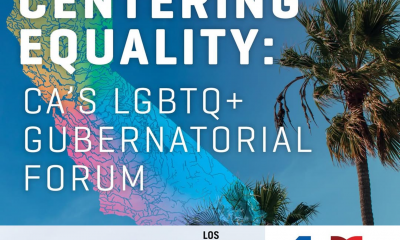
 California Politics7 hours ago
California Politics7 hours ago“I’ve always been an ally.” Seven gubernatorial candidates discuss LGBTQ+ rights at recent forum
-
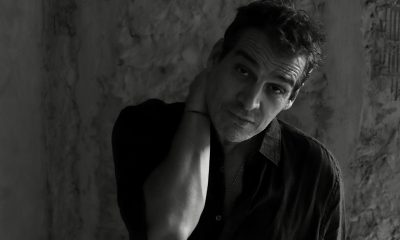
 a&e features9 hours ago
a&e features9 hours ago35 years after ‘Truth or Dare,’ Slam is still dancing

